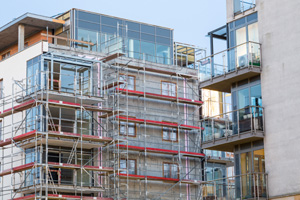 Living in a new apartment should not come with daily hazards. Unfortunately, unsafe conditions in apartment buildings are a common issue that leads to serious injuries or health risks. If you’re living in an apartment that is not up to code, or if you’ve been injured due to neglected maintenance, you might be wondering about your legal options.
Living in a new apartment should not come with daily hazards. Unfortunately, unsafe conditions in apartment buildings are a common issue that leads to serious injuries or health risks. If you’re living in an apartment that is not up to code, or if you’ve been injured due to neglected maintenance, you might be wondering about your legal options.
Every apartment tenant has the right to a safe and habitable living environment protected under local housing codes, landlord-tenant laws, and lease agreements. Landlords or property management is typically responsible for maintaining structural elements, ensuring proper sanitation, and keeping electrical, plumbing, and heating systems in safe working order. When landlords fail to meet these obligations, you may hold them accountable for any resulting damages or injuries. The lawyers of Goza & Honnold will help you understand your legal options and how to take the appropriate steps to address these issues to seek justice and compensation.
Seeking a Claim for Unsafe Apartment Building Conditions
Even if your apartment building is new, hazards and issues may arise that warrant prompt remedy from your landlord or management company. If a breach of duty results in your injuries, you may have legal options. Here’s how you can pursue a claim for unsafe apartment building conditions:
Understand Your Rights as a Tenant
You need to prove that the apartment complex has a responsibility to ensure your safety. Fortunately, this obligation is mandated by both state and federal laws. Landlords, including those running apartment complexes, must adhere to the federal Fair Housing Act as well as state premises liability regulations.
In essence, the landlord or management company has a legal obligation to:
- Ensure living spaces are habitable
- Keep common areas in good condition
- Regularly inspect the property for any damage or hazards
- Perform necessary repairs when they become aware of any dangerous conditions, either through direct knowledge or obvious signs
- Provide adequate warnings to tenants and guests if immediate repairs can’t be made
This duty of care is established by the landlord-tenant relationship.
Document the Conditions
Start by documenting the unsafe conditions. Take clear photos or videos of the problem areas, including any visible damage or construction hazards that contribute to the unsafe environment. It’s also beneficial to keep a record of all communication with your landlord about these issues, including emails, texts, or letters requesting repairs.
Report the Issue
Before pursuing legal action, report the unsafe conditions to your landlord or property management in official writing. Provide a reasonable opportunity to address the issues. If the landlord fails to make the necessary repairs within a reasonable timeframe, you can escalate the matter. Consider reporting the issue to local health or building inspectors, who can issue official notices or fines to the landlord.
Consult a Legal Professional
If your landlord still hasn’t remedied the unsafe conditions, it might be time to consult with a legal professional. The lawyers of Goza & Honnold have focused knowledge of tenant rights and will offer guidance based on your specific situation. We can help you understand your options, which might include pursuing legal action for damages, withholding rent, or even terminating your lease without penalty.
Consider Legal Action
In cases where the unsafe conditions have directly resulted in harm or distress, you may have grounds for a lawsuit. Potential claims could include personal injury, breach of contract, or violation of health and safety codes. Successful legal action can result in compensation for medical bills, pain and suffering, and possibly relocation costs if you need to move out due to the unsafe conditions.
How to Prove Liability for Apartment Complex Injuries
Proving liability in apartment complex injury cases is crucial to obtaining compensation for the damage you suffered due to unsafe construction. The following is a step-by-step guide on how to establish fault with the guidance of the lawyers of Goza & Honnold:
Identify the Responsible Parties
In many cases, the liable party might be the property owner or management company that failed to maintain safe premises. However, liability could also extend to maintenance staff, third-party contractors, or even other tenants, depending on the circumstances of the injury.
Establish a Duty of Care
To prove liability, you must first establish that the defendant owed you a duty of care.. In the context of an apartment complex, the property owner or manager holds a legal obligation to ensure the apartments are reasonably safe and void of construction hazards. This includes regular maintenance, timely repairs, and adequate security measures.
Display Breach of Duty by Liable Parties
Once you establish a duty of care, you must demonstrate that the property owner or manager breached that duty. This involves showing the property owner was cognizant or should have been cognizant of the hazardous condition and failed to correct it. Evidence can include maintenance records, inspection reports, correspondence with the management, and witness statements.
Link the Injury to the Breach
Proving the injury was directly caused by the breach of duty is critical. This means connecting the unsafe condition in the apartment complex to your injury. Medical records, accident reports, and expert testimony are instrumental in demonstrating this causation.
Speak With the Apartment Injury Lawyers of Goza & Honnold
At Goza & Honnold, we understand the challenges tenants face when living in unsafe apartment conditions. Our team is dedicated to ensuring your living environment meets legal standards for safety and habitability. With a proven track record in tenant rights cases, we bring extensive experience and a meticulous approach to every claim.
Our attorneys work closely with clients to document unsafe conditions, report issues effectively, and navigate the complexities of tenant-landlord laws. We are committed to holding negligent landlords accountable and securing fair compensation for our clients. Contact us at (913) 451-3433 or through our contact form.

Goza & Honnold, a trusted personal injury law firm serving Missouri and Kansas, is known for our dedication to client advocacy and trial excellence. With a strong focus on auto accidents, medical negligence, and product liability cases, our experienced attorneys work diligently to secure fair outcomes while being fully prepared to take cases to trial when necessary. We work closely with our clients to build strong cases that reflect their unique experiences.
